Dwight Muhammad Qawi, born as Dwight Braxton in 1953, is a remarkable figure in the history of boxing. His life embodies a story of redemption and resilience that resonates deeply within the sport. Qawi’s talent and tenacity made him not only a two-weight world champion but also a fascinating spectacle for boxing fans. His story begins not in the typical gyms where boxing greats often hone their skills but in the challenging environment of prison. Here, amidst hardship, Qawi learned to fight, taking his first steps towards a career that would see him become one of the most feared fighters in the ring.
Standing at an unassuming 5’6″, Qawi’s physical stature belied his ferocity and skill. When he emerged from prison after serving time, he was raw and eager, with an unrivaled hunger to succeed. His early professional career exhibited initial struggles, evidenced by a 1-1-1 record. However, this early adversity served as a crucible, forging Qawi into a fighter who was not only hungry for victory but also adept at slipping punches and countering with ruthless efficiency.
No one can argue that Qawi’s ascension in the boxing world was nothing short of meteoric. His fighting style was characterized by a whirlwind of punches that seemed to flow endlessly from his fists. Nicknamed “The Camden Buzzsaw,” he earned this moniker due to his relentless, aggressive approach in the ring. Qawi’s ability to impose his will on opponents was complemented by his exceptional defensive skills—a rare duality that made him an exceptional fighter.
His wins over renowned fighters like Mike Rossman and Matthew Saad Muhammad showcased his capability to outwork and outmaneuver taller, ostensibly superior opponents. His infamous bouts became a display of strategic mastery blended with raw aggression. By the time he reached the pinnacle of his career, Qawi had transformed into a polished, skilled fighter—proving once again that greatness in boxing often emerges from unorthodox beginnings.
One of the defining moments of Qawi’s career came in a historical 1986 showdown against Evander Holyfield. This fight remains a hallmark of boxing lore, depicting an epic clash of wills and styles. Though Qawi ultimately lost, the bout is remembered for its intensity and the heart displayed by both fighters. The encounter raised questions about the nature of sportsmanship and even doping in the sport, with rumors perpetuating the idea that Holyfield might have had an unfair advantage. Regardless of the circumstances, Qawi’s performance during those grueling 15 rounds solidified his status as a relentless warrior in the sport.
Even after setbacks, such as the loss to Michael Spinks—which was compounded by a significant injury—Qawi continued to fight, facing heavyweight legends like George Foreman. His tenacity and spirit were on display even when the odds stacked against him. In these later years, Qawi came close to reclaiming a piece of the cruiserweight title, proving that age and past setbacks couldn’t dampen his fighting spirit.
Qawi’s professional record of 41 wins, 11 losses, and one draw may not completely capture the essence of his impact on boxing. His Hall of Fame induction in 2003 came as a testament to his remarkable career and the impression he left on the sport. While many remember him for his losses—especially against formidable opponents—his journey continues to inspire countless fans and aspiring boxers alike.
As we celebrate Qawi’s 72nd birthday, we not only honor the path he forged through adversity and challenge, but we also recognize him as a vital chapter in boxing history. His legacy transcends the numbers of wins and losses; it is rooted in the indomitable spirit of a fighter who embodies perseverance against all odds. In reflecting on his life and career, we find that true greatness often lies not just in victories, but in the relentless pursuit of one’s aspirations. Happy birthday, Dwight Muhammad Qawi!

